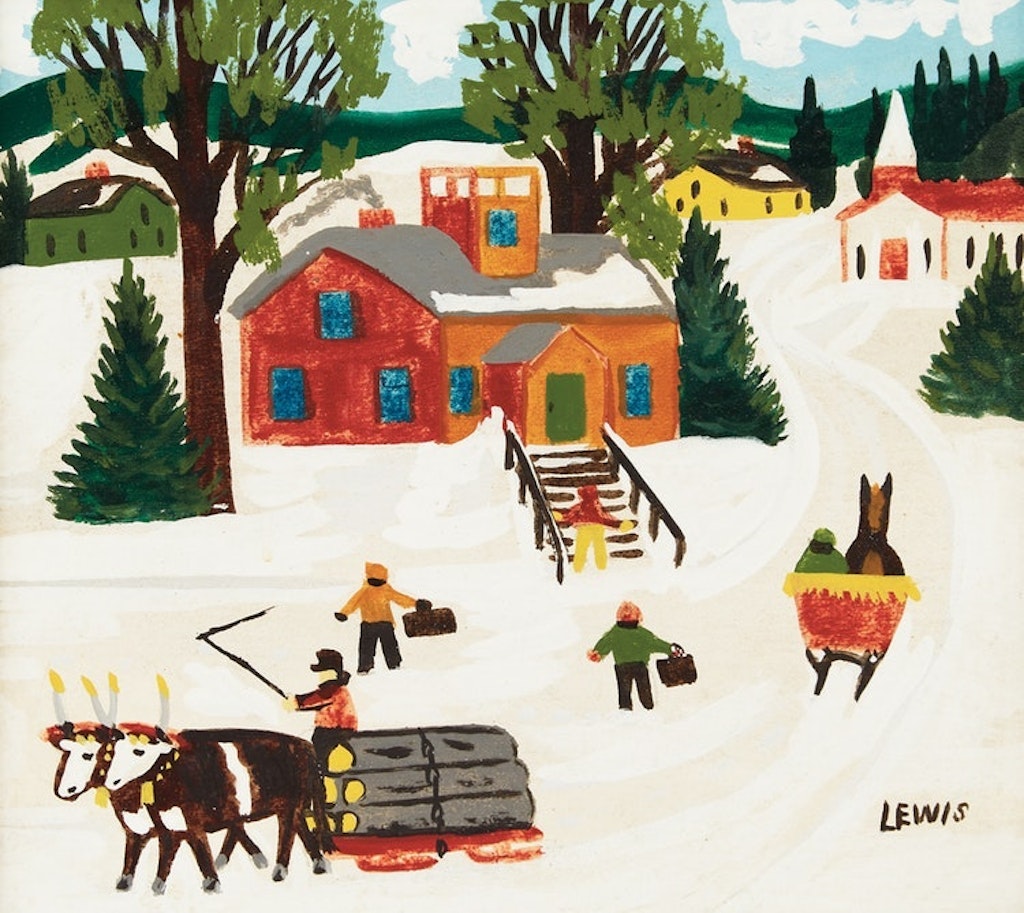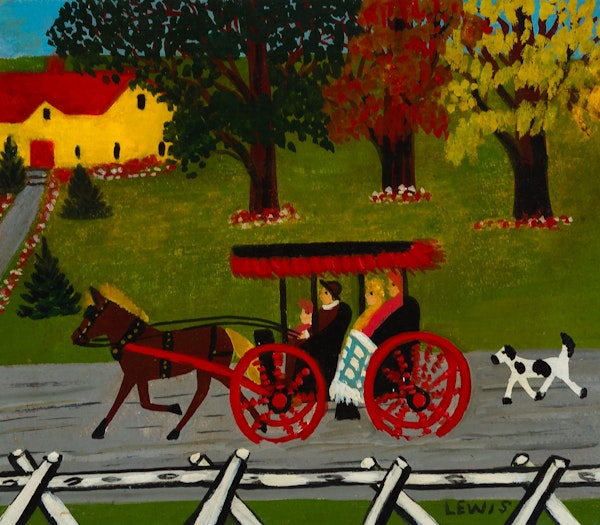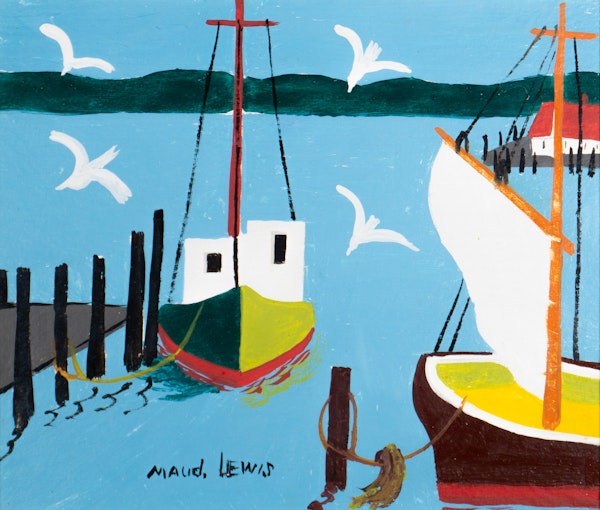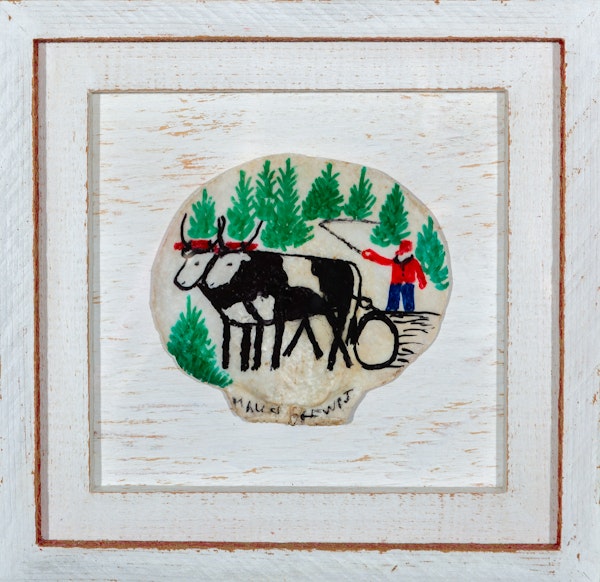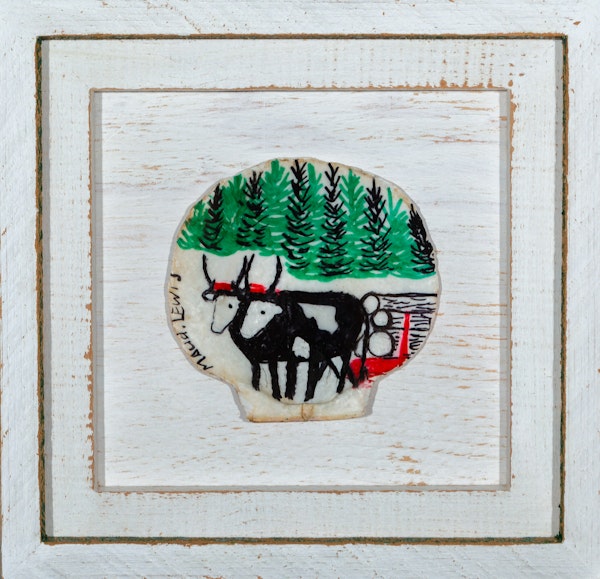School House in Winter
Sold
Maud Lewis
1901 - 1970
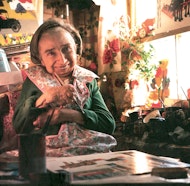
Maud Lewis (née Dowley) was born in 1901 in South Ohio, Nova Scotia. Her father was a harness maker and her mother cared for Lewis as she suffered with juvenile rheumatoid arthritis. She and her mother painted Christmas cards together during the holiday season. As a young girl, Lewis enjoyed the company of her family and cat named Fluffy.
As she got older, the world around her began to make note of her physical differences. She became more reclusive, seeking the comfort of her family as her life outside became harsher. In 1928, Lewis’ life was shaken by scandal after having an illegitimate daughter named Catherine. The baby was adopted. Maud’s parents passed away a few years later in quick succession. She lived briefly with her older brother, Charles, but he later sent her to live in Digby with her Aunt, Ida Germaine.
10 years after the birth of her daughter, Maud married Everett Lewis, a fish salesman. He had placed an ad for a live-in housekeeper. Maud walked alone for 6 miles to and from Everett’s house to meet him. They married about a couple weeks later. Her family and community, particularly her aunt she was living with at the time, disapproved of the pairing; Everett had a reputation for inappropriate behaviour.
The couple settled into married life. Everett continued to sell fish, travelling around the community in his Model T that would be featured in many of Maud’s future paintings. Lewis stayed home in their one room, cluttered cottage. She began to paint the walls of the house as well as household items like tins and dustpans. Among other objects Maud painted were scallop shells, a readily available material in the Maritimes. As Maud began to paint more frequently and sell her work, Everett cut her support boards. Maud painted with whatever she could get her hands on, even boat enamel. Due to her disability, Lewis’ brushstrokes were practically rectilinear; she did not have the full range of motion in her hands to express herself in a looser fashion.
The life of Maud Lewis was a difficult one, with glimpses of positivity visualised by the artist through her painting. Despite her hardship, Lewis used her paintings as a means to uplift herself and her collectors. She sold many works during her lifetime, albeit for a meagre fraction of what they now sell for. Following frenzied media coverage after the first CBC interview in 1964, Lewis’ roadside house and studio became a tourist attraction. Lewis was promoted early on by gallerists Willard Ferguson and Claire Stenning, featured in the 1965 CBC documentary that led to her rise in popularity. She and her husband Everett sold works for as little as $5, worried that raising their prices would result in less interest. Nevertheless, people arrived in droves to purchase paintings by Maud Lewis. Even an aide for Richard Nixon, then president of the United States, sent for 2 paintings by the artist for the White House.
As time passes on, so do the stories that accompany the ebullient paintings of Maud Lewis. The majority of paintings by Lewis that have passed through Mayberry Fine Art were bought from Maud herself and have been cherished for generations. With every painting comes a story of idyllic summer vacations spent in Nova Scotia, in which children accompanied their parents to visit the little painted house on the side of the road in Marshalltown.
Click here to view clips from a talk by Shaun and Bill Mayberry about Maud Lewis' life and work.
Maud Lewis
1901 - 1970

Maud Lewis (née Dowley) was born in 1901 in South Ohio, Nova Scotia. Her father was a harness maker and her mother cared for Lewis as she suffered with juvenile rheumatoid arthritis. She and her mother painted Christmas cards together during the holiday season. As a young girl, Lewis enjoyed the company of her family and cat named Fluffy.
As she got older, the world around her began to make note of her physical differences. She became more reclusive, seeking the comfort of her family as her life outside became harsher. In 1928, Lewis’ life was shaken by scandal after having an illegitimate daughter named Catherine. The baby was adopted. Maud’s parents passed away a few years later in quick succession. She lived briefly with her older brother, Charles, but he later sent her to live in Digby with her Aunt, Ida Germaine.
10 years after the birth of her daughter, Maud married Everett Lewis, a fish salesman. He had placed an ad for a live-in housekeeper. Maud walked alone for 6 miles to and from Everett’s house to meet him. They married about a couple weeks later. Her family and community, particularly her aunt she was living with at the time, disapproved of the pairing; Everett had a reputation for inappropriate behaviour.
The couple settled into married life. Everett continued to sell fish, travelling around the community in his Model T that would be featured in many of Maud’s future paintings. Lewis stayed home in their one room, cluttered cottage. She began to paint the walls of the house as well as household items like tins and dustpans. Among other objects Maud painted were scallop shells, a readily available material in the Maritimes. As Maud began to paint more frequently and sell her work, Everett cut her support boards. Maud painted with whatever she could get her hands on, even boat enamel. Due to her disability, Lewis’ brushstrokes were practically rectilinear; she did not have the full range of motion in her hands to express herself in a looser fashion.
The life of Maud Lewis was a difficult one, with glimpses of positivity visualised by the artist through her painting. Despite her hardship, Lewis used her paintings as a means to uplift herself and her collectors. She sold many works during her lifetime, albeit for a meagre fraction of what they now sell for. Following frenzied media coverage after the first CBC interview in 1964, Lewis’ roadside house and studio became a tourist attraction. Lewis was promoted early on by gallerists Willard Ferguson and Claire Stenning, featured in the 1965 CBC documentary that led to her rise in popularity. She and her husband Everett sold works for as little as $5, worried that raising their prices would result in less interest. Nevertheless, people arrived in droves to purchase paintings by Maud Lewis. Even an aide for Richard Nixon, then president of the United States, sent for 2 paintings by the artist for the White House.
As time passes on, so do the stories that accompany the ebullient paintings of Maud Lewis. The majority of paintings by Lewis that have passed through Mayberry Fine Art were bought from Maud herself and have been cherished for generations. With every painting comes a story of idyllic summer vacations spent in Nova Scotia, in which children accompanied their parents to visit the little painted house on the side of the road in Marshalltown.
Click here to view clips from a talk by Shaun and Bill Mayberry about Maud Lewis' life and work.
